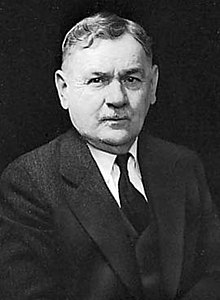Clark Wissler
| Clark Wissler | |
|---|---|
 |
|
| Born |
September 18, 1870 Cambridge City near Hagerstown, Indiana |
| Died | August 25, 1947 (aged 76) New York City |
| Nationality | American |
| Fields | anthropologist |
| Alma mater | Columbia University |
| Known for | North American ethnography |
Clark David Wissler (September 18, 1870 – August 25, 1947) was an American anthropologist.
Born in Cambridge City near Hagerstown, Indiana, Wissler graduated from Indiana University in 1897. He received his doctorate in psychology from Columbia University in 1901. After Columbia, Wissler left the field of psychology to focus on Anthropology. Clark Wissler worked at the American Museum of Natural History as a Curator in ethnology from 1902 to 1907. In 1907 Wissler was named Curator of Anthropology when the Archaeology and Ethnology departments were recombined under the Department of Anthropology. Clark Wissler was the first anthropologist to perceive the normative aspect of culture, to define it as learned behavior, and to describe it as a complex of ideas, all characteristics of culture that are today generally accepted. Wissler was a specialist in North American ethnography, focusing on the Indians of the Plains. He contributed to the culture area and age-area ideology of the diffusionist viewpoint that is no longer popular in anthropology. Ball State University in Muncie, Indiana holds the papers of Clark Wissler. Furthermore, one hall of Indiana University's Teter Living Center is known as "Clark Wissler Hall".
Clark Wissler is a renowned American anthropologist and archaeologist who was born on September 18, 1870 in Wayne County, Indiana. After graduating from Hagerstown High School, he taught in local schools between 1887 and 1892, and studied at Purdue University after the six-month school term ended. The following year in 1893 he was the principal of Hagerstown High School, and then he resigned his post and enrolled in Indiana University.
Wissler received his BA in Experimental Psychology in 1897 and received his MA in 1899. Wissler married Etta Viola Gebhart on June 14, 1899 and he fathered a son and a daughter, Stanley Gebhart Wissler and Mary Viola Wissler. In 1899 Wissler was appointed assistant in psychology at Columbia University. He continued his psychology graduate work under James McKeen Cattell and he received his Ph.D. in psychology in 1901. From 1901 to 1903 Wissler performed research on individual mental and physical differences. Wissler's doctoral dissertation used the new Pearson Correlation Coefficient formula to show that there was no correlation between scores on Cattell's IQ tests and academic achievement. Wissler's dissertation eventually led the psychology movement to lose interest in psychophysical testing of intelligence.
...
Wikipedia
